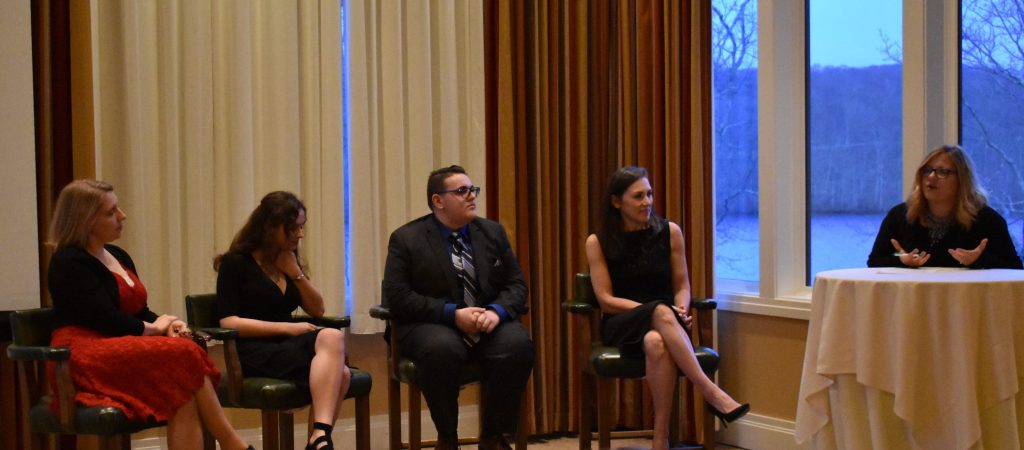A Rare Opportunity: A Glimpse Into Life with Visual Impairment
“Look like you can see!” Dante Priebe implores to his panicked, visually impaired sister Sofia as she struggles behind the wheel to make a three-point turn in her driveway.
“I do this horrible, 18-point turn and a cop car drives by in those three minutes,” Sofia says.
She ends up in the street and Dante yells at her to pull into the neighbor’s driveway and “act like she can see.”
The car ends up on their lawn, with Sofia shouting at her brother, “I don’t want to do this anymore!!!”
The audience laughed, and so did Sofia, as she recounted her story during a discussion at “A Rare Opportunity,” a gathering of more than 100 people to hear stories from people with Leber congenital amaurosis (LCA) and other rare inherited retinal diseases (IRDs).
Sofia is the daughter of Laura Manfre and Chuck Priebe, co-founders of Sofia Sees Hope, dedicated to helping people affected by LCA and other IRDs. Sofia’s parents founded the organization after her 2013 genetic diagnosis, giving hope that genetic research could produce sight-saving treatment.
Awareness is appreciated
The March 30 event at Lake of Isles, North Stonington, CT, featured Nicole Kear, author of “Now I See You,” (see accompanying story) detailing her reckoning as her world blurs due to Retinitis Pigmentosa (RP), a rare disease causing slow and progressive retinal degeneration.
Nicole, of Brooklyn, NY, joined a panel discussion with Sofia, Christian Guardino and Diana Owen for an exchange about what it’s like to live with visual impairment.
In the panel moderated by Nicole’s friend, author and professor Dr. Amy Bass, the participants said they wished people would be more aware of others with disabilities.
Nineteen-year-old Christian of Patchogue, NY, said he wishes he could take part in a common teenage rite of passage.
“I think one of the biggest things is I see all of my friends driving and getting their licenses, and it makes me want to do it even more.
“But I feel like I’m saving a lot of money.”
In 2017, Christian stepped onto the America’s Got Talent audition stage and blew away the judges with his rendition of the Jackson 5’s “Who’s Lovin’ You.”
He recently released his first original song, “Waiting,” executive produced by country singing star Hunter Hayes.
Christian lived with degenerative vision due to LCA2, known as LCA-RPE65, since he was a toddler, but all that changed when he underwent experimental surgery five years ago in a clinical trial for a revolutionary genetic treatment. His vision improved dramatically with the treatment called LUXTURNA™. Spark Therapeutics developed the drug that the Food and Drug Administration approved at the end of 2017.
Independence vs. asking for help
Diana Owen, Head of School at Pine Point School in Stonington, CT, was diagnosed in her 40s with a macular hole, a condition resulting in vision changes over time.
She lives with a constant, sometimes frustrating, sense of having to work around situations to accommodate her vision.
“When my issue developed what I didn’t understand was about acuity,” she said.
Her visual acuity manifested as darkened spots, haze and distortion.
A macular hole is a small break in the macula, in the center of the eye’s light-sensitive tissue called the retina. The macula provides the sharp, central vision needed for reading, driving and seeing fine detail. It can cause blurred and distorted central vision.
Nicole said she never wanted to use a cane: “When you open the cane, this is the cane and I’ve disappeared.”
Sofia is a high school sophomore who savors independence. She has LCA with a mutation of her IQCB1/NPHP5 gene, one of the more than 25 gene mutations known to cause the disease.
“I’m very stubborn,” she said. “I’d like to do things on my own. Being blind doesn’t mean full no-vision. (People) try to help me with things and, I’m like, I got it!”
And she does! In academics, dancing and rowing. Sofia’s a spokesperson for “Remote Coxswain” technology, invented by her rowing coach, so she can row solo. The tool features a remote-controlled rudder than can be operated by a coxswain up to 500 feet away.
Transitioning to dinner, the panel and the audience heard Christian’s new song fill the grand room. Listen for yourself.

